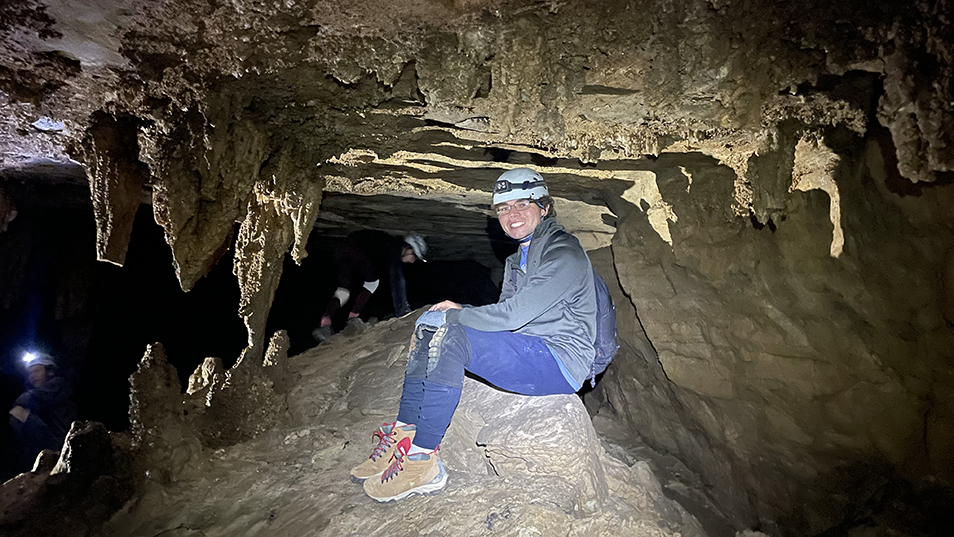Contact us
401 W. Kennedy Blvd.
Tampa, FL 33606-13490
(813) 253-3333
Scaling mountains of data, Robert Cooper is planning to protect the national parks.

Robert Cooper ’25, a finance and management student, has spent his Summer Undergraduate Research Fellowship (SURF) developing a recommendation to address overcrowding in the national parks in Utah. He started the project last summer when he visited Mammoth Cave National Park in Kentucky. Photo courtesy of Cooper
Scaling mountains of data, Robert Cooper is planning to protect the national parks.
His project entails four parts: collecting data through running statistical models; writing a recommendation plan for the parks; proposing the plan in person; and then presenting his findings at the SURF symposium in late August.
Cooper received $2,000 in travel funds for his project and a $3,500 personal stipend to travel to Utah’s five national parks in July with Lecturer Suzanne Dieringer. He will present his plan to park rangers in each park while he is there.
He focused on the national parks in Utah, specifically Zion National Park, because, he said, it is the “poster child” for overcrowding.
“Their visitation has gone up, like, 40% in the past 10 years, but the budget, when you adjust for inflation, has actually gone down. They're having a bunch of issues,” he said.
He started researching last summer, inspired after his selection to the National Collegiate Honors Council’s Partners in the Park program, where he visited Mammoth Cave National Park in Kentucky.
“I'd never visited a national park before that, and going, I saw what the hype’s about. And it got me thinking, This is something I could do for my research,” he said.
Cooper learned about the Kentucky park's preservation of ancient fossils and historical artifacts from the 1800s. He also learned about the extinction of native species before the park was established and its status protected the animals.
Then, through his research, Cooper discovered overcrowding also threatened the local ecosystem.
“Because of the overcrowding issue, there's a lot of what's called ‘social trails.’ Basically, it’s when people go off the main trails, forge their own path and damage vegetation. There's some research that when people see other people do it, they're more likely to. As visitation is increasing, more people are starting to do it.”
Cooper said visitors are also starting to leave waste on the trails. Park rangers are overwhelmed.
The solutions aren’t simple.
The easy option would be to just recommend increasing the entrance fees, Cooper said. Some park passes have doubled, or even tripled, in price since the pandemic.
“But over at Arches National Park in Utah, they don't want to do that because that would shut out lower-income individuals," Cooper said. "It goes against (their) core mission of trying to keep it accessible for everyone.”
Besides the ethics, there are concerns about what can be feasibly implemented, he further explained, such as a timed reservation system. The timed solution allows a certain number of visitors to pick the time they go into the park, reducing wait times and crowds at peak hours. He also recommends better public transportation within the parks.
“You're not having as good of a time if you're searching around for two hours for a parking spot,” Cooper said.
The entire point of his research is to provide an extra resource for the National Park Service, Cooper said.
The parks are “supposed to preserve these resources for the enjoyment of people now and for future generations. And overcrowding puts that mission at risk,” he said.
“If they don't address it, it'll create these issues where you're not going to have that unimpaired scenery, or landscape or resources that the parks were originally founded to protect.”
More UT News